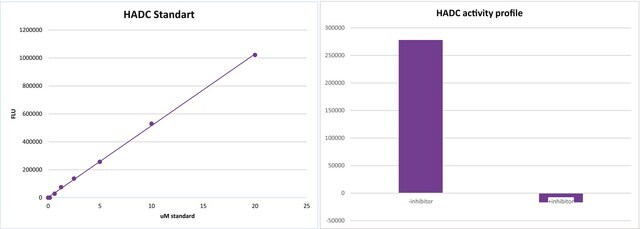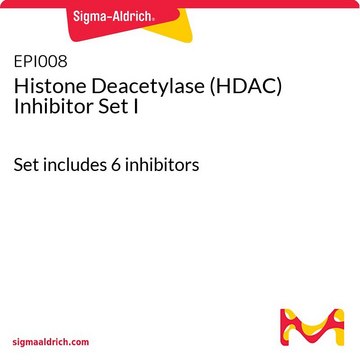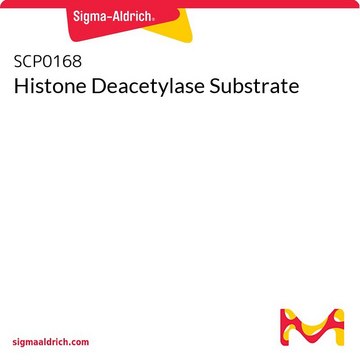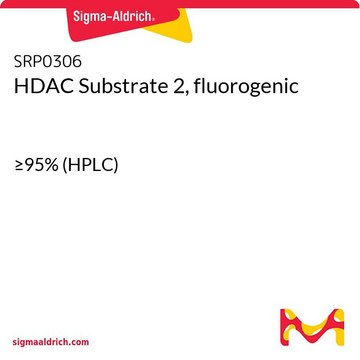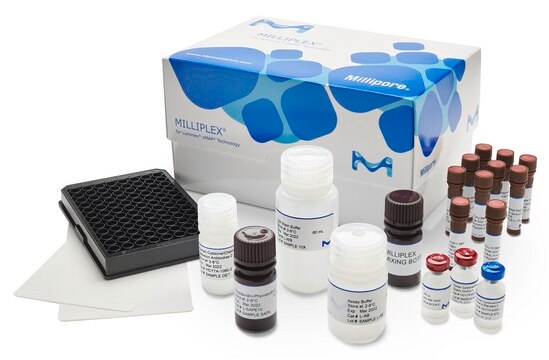EPI007
Histone Deacetylase 8 (HDAC8) Inhibitor Screening Kit
100 assays in 96 well plates
Iniciar sesiónpara Ver la Fijación de precios por contrato y de la organización
About This Item
Productos recomendados
uso
100 assays in 96 well plates
Nº de acceso NCBI
Condiciones de envío
wet ice
temp. de almacenamiento
−20°C
Información sobre el gen
human ... HDAC8(55869)
mouse ... HDAC8(70315)
Descripción general
Histone deacetylases (HDACs) are a large family of enzymes that remove acetyl groups from histone proteins. Site specific histone acetylation and deacetylation have been shown to activate or repress eukaryotic gene transcription, respectively, and as a consequence, HDACs play a crucial role in mammalian development and disease. HDACs are involved in important biological activities, such as cell differentiation, proliferation, apoptosis, and senescence.
With Sigma′s HDAC8 Inhibitor Screening Kit, HDAC8 Enzyme acts with the supplied Developer to deacetylate and then cleave the HDAC8 Substrate (R-H-K(Ac)-K(Ac)-AFC). This activity releases the quenched fluorescent group, AFC, which can be detected at Em/Ex=380/500 nm. In the presence of a HDAC8 inhibitor, AFC is not released and its fluorescence remains quenched. The kit provides a rapid, simple, sensitive, and reliable test, suitable for either individual tests or high throughput screening of HDAC8 inhibitors. Trichostatin A (TSA) is included as a control inhibitor to compare with the efficacy of test inhibitors.
With Sigma′s HDAC8 Inhibitor Screening Kit, HDAC8 Enzyme acts with the supplied Developer to deacetylate and then cleave the HDAC8 Substrate (R-H-K(Ac)-K(Ac)-AFC). This activity releases the quenched fluorescent group, AFC, which can be detected at Em/Ex=380/500 nm. In the presence of a HDAC8 inhibitor, AFC is not released and its fluorescence remains quenched. The kit provides a rapid, simple, sensitive, and reliable test, suitable for either individual tests or high throughput screening of HDAC8 inhibitors. Trichostatin A (TSA) is included as a control inhibitor to compare with the efficacy of test inhibitors.
Características y beneficios
- Simple, sensitive, and reliable assay
- Simple procedure; takes ~60 min
- Utilizes fluorometric methods
- Sample type: candidate HDAC8 inhibitors
- Suitable for screening HDAC8 inhibitors
- Suitable for individual tests or high throughput assays
- Convenient 96-well microplate format
Producto relacionado
Referencia del producto
Descripción
Precios
Código de clase de almacenamiento
10 - Combustible liquids
Clase de riesgo para el agua (WGK)
WGK 3
Punto de inflamabilidad (°F)
188.6 °F - closed cup
Punto de inflamabilidad (°C)
87 °C - closed cup
Elija entre una de las versiones más recientes:
Certificados de análisis (COA)
Lot/Batch Number
It looks like we've run into a problem, but you can still download Certificates of Analysis from our Documentos section.
Si necesita más asistencia, póngase en contacto con Atención al cliente
¿Ya tiene este producto?
Encuentre la documentación para los productos que ha comprado recientemente en la Biblioteca de documentos.
Ji Heon Noh et al.
Cancer research, 74(6), 1728-1738 (2014-01-23)
Aberrant regulation of histone deacetylase 2 (HDAC2) contributes to malignant progression in various cancers, but the underlying mechanism leading to the activation of oncogenic HDAC2 remains unknown. In this study, we show that HDAC2 expression is upregulated in a large
Astrid M Kral et al.
Biochemistry, 53(4), 725-734 (2014-01-24)
Histone deacetylases (HDACs) play diverse roles in many diseases including cancer, sarcopenia, and Alzheimer's. Different isoforms of HDACs appear to play disparate roles in the cell and are associated with specific diseases; as such, a substantial effort has been made
Johannes Gräff et al.
Cell, 156(1-2), 261-276 (2014-01-21)
Traumatic events generate some of the most enduring forms of memories. Despite the elevated lifetime prevalence of anxiety disorders, effective strategies to attenuate long-term traumatic memories are scarce. The most efficacious treatments to diminish recent (i.e., day-old) traumata capitalize on memory updating
Ouafa Zerzaihi et al.
Biochemistry and cell biology = Biochimie et biologie cellulaire, 92(1), 61-67 (2014-01-30)
Besides its direct metabolic effects, insulin induces transcriptional alterations in its target tissues. However, whether such changes are accompanied by epigenetic changes on the chromatin template encompassing insulin responsive genes is unclear. Here, mRNA levels of insulin-responsive genes hexokinase 2
Nicole L Regna et al.
Clinical immunology (Orlando, Fla.), 151(1), 29-42 (2014-02-08)
We sought to determine if a specific class I and II HDAC inhibitor (ITF2357) was able to decrease disease in lupus-prone NZB/W mice through regulation of T cell profiles. From 22 to 38 weeks-of-age, NZB/W and non-lupus NZW mice were
Nuestro equipo de científicos tiene experiencia en todas las áreas de investigación: Ciencias de la vida, Ciencia de los materiales, Síntesis química, Cromatografía, Analítica y muchas otras.
Póngase en contacto con el Servicio técnico